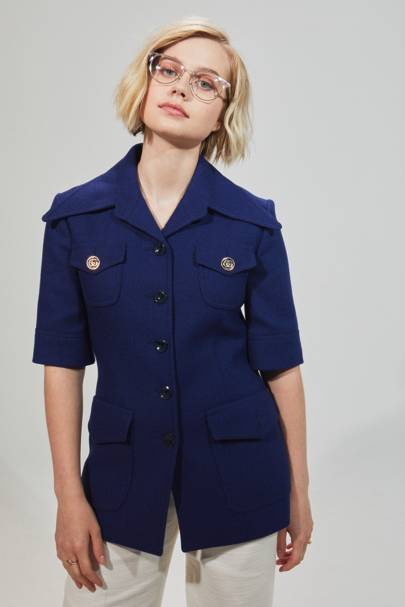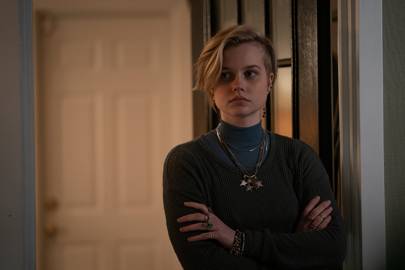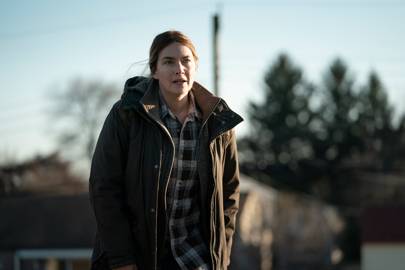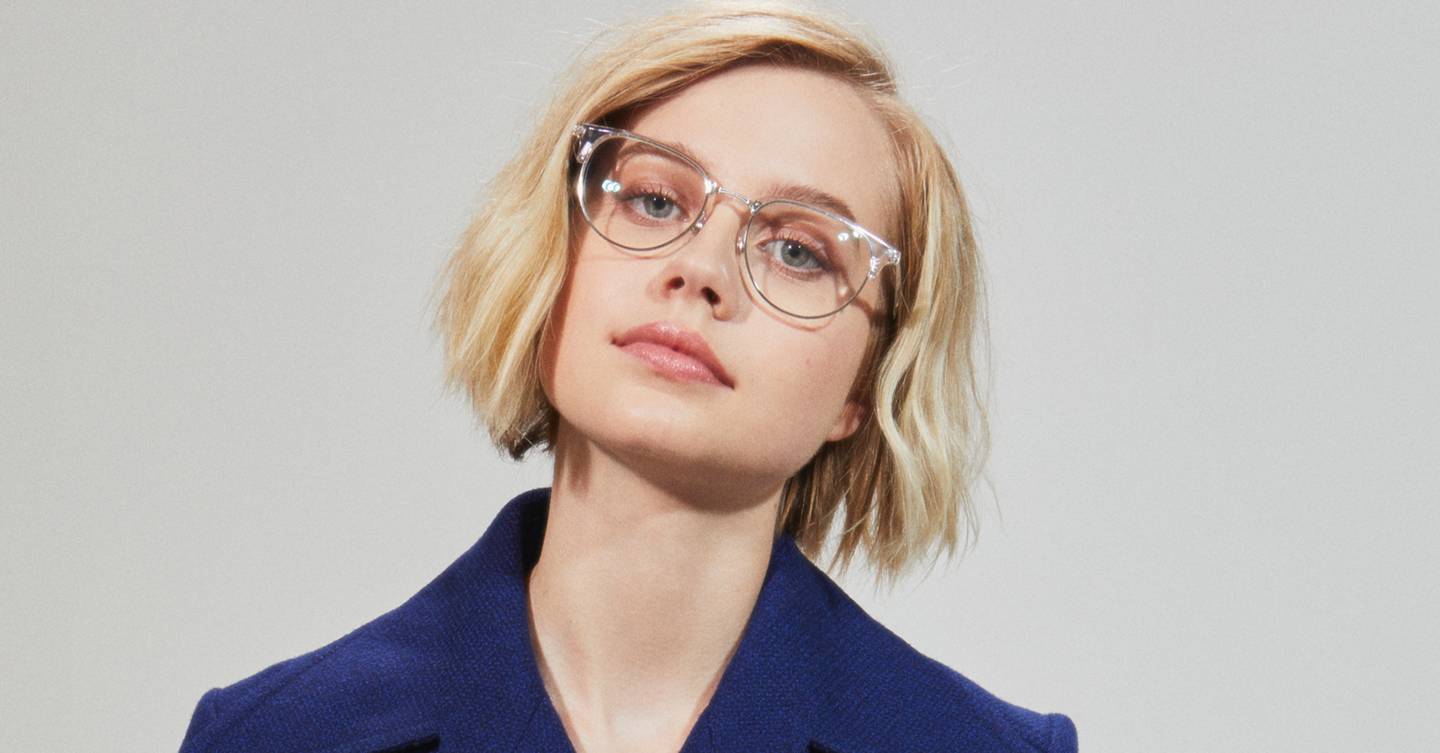There are addictiveTV shows and then there is Kate Winslet playing a downtrodden detective in Mare of Easttown. It’s an acting masterclass as Kate’s Mare battles personal trauma whilst trying to solve the murder of a young single mother from her close knit community in Philadelphia. It’s more addictive than Line of Duty, and I do not say that lightly!

Evan Peters, Guy Pearce and Jean Smart (who played Reese Witherspoon’s mother-in-law in Sweet Home Alabama, iconic!) also co-star, but it’s Angourie Rice’s standout performance playing Kate’s daughter, Siobhan, that goes toe-to-toe with Kate’s. You may recognise Angourie from Spiderman: Homecoming and Black Mirror, but this is a career making performance for the 20-year-old from Melbourne, Australia, as she tactfully explores sexuality, mental health, trauma and coming of age.
Here, speaking from her home down under, Angourie talks about Kate Winslet remaining on set to help her through a sex scene, why it’s important we all discuss female safety more openly, and her own Mare of Easttown plot theories…
We need to talk theories! When you first got the Mare of Easttown script who did you think was guilty AF?
From episode one, I was pretty suspicious of Richard Ryan and my whole family is suspicious! Guy Pearce just has a guilty look about him, I guess! Plus he’s the new guy in town, what’s his story? Nobody knows!
What connected you to Siobhan?
I really connected with her because she has gone through a lot in her life. She has dealt with grief and trauma but she’s so driven to keeping everything together. She holds everyone together and feels a pressure to make peace, dissolve conflict and be the go-between between her family. I feel similar sometimes as I don’t like conflict. She’s also an 18-year-old trying to figure out what she’s doing, what she wants to do, how to leave her family and if she wants to leave her family for college. And when we started filming, I was 18 and I just finished school so I was also questioning my place in the world. I mean, I’m still trying to figure it out but especially when we started filming, I was living alone, by myself for the first time in my life. I was learning to grow up and be an adult as Siobhan was also figuring that out in her life.
I am 31 years old and still trying to work out how to be an adult so I wouldn’t worry…
I was just so shocked that I wear so many clothes, they all get dirty, I have to wash them, I wear them again and then I have to wash them again! It’s an endless cycle and I didn’t realize. Suddenly, I was like, “Oh my gosh, I feel terrible for my poor parents having to wash my clothes for 18 years!”

Mare of Easttown covers a hybrid of topics from mental health, to trauma and sexuality. What topic spoke to you the most?
Mental health is really well done in the show, especially watching it back, like the scenes with Mare in the psychologist’s office. They’re really well-written and well-executed. I really connected with that as it’s oddly funny in some ways, especially the scenes with the three women living in the same house together. They’re all dealing with really intense stuff, but they also find moments of lightness, because you just have to keep going. You have to keep living. You have to keep finding things to laugh about, despite feeling like your life is falling apart or everything’s going wrong. Mental health isn’t just handled in a dark, depressing and horrible way in this and it shows happy and sad emotions can exist at the same time – that is nuanced.
What’s your own relationship with mental health been like and how has that changed?
In high school, I struggled. I thought of myself as Hannah Montana. I had one life doing film work, and then one life at school. These two worlds never intersected so I really struggled with trying to figure out how to reconcile these two parts of myself. Now that I’m out of high school, I’ve got more perspective on it, and I don’t think about myself putting on the Hannah Montana wig, and being a completely different person in my work life versus my home life. That’s come with a combination of time, talking to people, and my family keeping me grounded, because they are the thing that connects me to all aspects of my life.

One of the things I love about Siobhan’s story is she has relationships with women but no one in her family or the community label or question her sexuality. What did playing her teach you about the queer experience?
What drew me to Siobhan’s story as well, is her love story. Her story is a bit of lightness because she’s falling in love and she’s figuring out, ‘who do I want to be with?’ She’s with her high school girlfriend, it’s not really working and there’s nothing wrong with it. It’s just that they don’t gel anymore and that’s part of her growing up and her coming-of-age story. Sometimes you just grow apart from people. I loved the beautiful story of finding someone new, getting to know someone new. That’s so exciting and wonderful for her.
I love that Kate Winslet stayed on set to help you through your first intimate scene. How did it feel to have her in your corner?
It was great because I was 18 and Kiah (McKirnan), who plays Anne in that scene, it was her first day on set. That’s an intimidating thing for them to schedule that as her first day and we had only been in production a few weeks. So it was really nice to have Kate there, also because it made things fun and silly. Kate climbed into the boot of the car so we could just have a laugh about it, and get it done without any awkward tension or weirdness. She really took a weight off our shoulders.
Kate actually got in the boot of the car?!
Yes! It was me, Kiah, two cameramen in the back seat, and then Kate in the boot of the car, yelling directions like, “We’ll go again!” Also usually, if you’re filming in a car, they give directions over the walkie talkie. You don’t want direction in those kinds of scenes over the walkie-talkie and everyone can hear it. So it was nice.

What a queen! What have you learned from working with Kate and what has she taught you?
That situation is a really good indication of what she’s like to work with. She’s really welcoming, always having fun on set, encouraging everyone to enjoy themselves and to feel safe and comfortable. But a lot of the time, we were doing heavy scenes, or it was freezing cold, or it was late at night and she was such a team leader. The four-year-old kid in the show called Kate the team leader which was such a good way of putting it. The show revolves around her, she had so many scenes with so many different people but she brought us together as one team.
The subject of female safetyis a central part of the storyline and it comes at a time that we are having very public discussions around that, especially in the UK, after the death of Sarah Everard. What has your own experience around safety been like?
It also comes at a time where we’re having a parallel discussion in Australia in politics as we’ve had a few women come out in the government, saying that the environment is really toxic. Who’s surprised? Not me! It’s a constant thing that you have to think about, isn’t it? A constant thought in the back of your head, wherever you go, whatever you do. It feels like a constant threat. An underlying threat. And you don’t know what that threat is or what form it might take, but it’s just always there.. It’s very important that people are talking about it but it upsets me that it takes something as drastic as another life lost to get people talking. But I am glad that people are listening to women, and what it’s like to live like that. But we also need to acknowledge that other factors come into play, too, and how this affects black women disproportionately, and trans women as well. It’s an important discussion but it can also be exhausting, especially for women to relive that trauma and to talk about it so frequently and to give so much of your own story to make people understand or make people believe.
Do you feel, sitting here as a 20-year-old woman in the entertainment industry – which has had many discussions around female safety in recent years after #MeToo – that it is a supportive environment now for women?
Yes! I started working in American films when I was 13 and I did an Australian film before that, when I was 11. I’ve grown up in the environment and I have always felt very safe and very protected. I have been fortunate, because I know some people don’t and I’ve been lucky with the people I’ve worked with. I also knew I could leave as well, that I had a place on the other side of the world that I could come home to, and be separate from all of that. That really helped me growing up.
But you look at something like Promising Young Woman and I was watching it shocked, thinking even five years ago, I don’t think this could have been made. I do feel hopeful for the future and to be a part of that. It is upsetting that it’s taken this long and it came at the expense of women having to unload their trauma in a public space, and have people ridicule that or pick it apart. But it’s changing the way the industry works and actually with the pandemic, I’ve really seen how quickly the industry can change because when it comes to safety in terms of the virus, people do just change overnight. We can change the way we work and we know we can change patterns and behaviors. It’s just a matter of doing the work to make that happen.
Emma, by Jane Austin. My mum read it to me when I was young and then I read it for myself when I was 17. I felt so hit by Emma. Not many people like Emma as a character as she’s kind of mean, she’s a bit vain and she can be quite cruel without realizing it. Reading a character that was so flawed in those ways and reading it in my final year of high school, I was like, “Oh my gosh, this is what I am like!” But she is also capable of change. We’re all very good at being proud of the parts of ourselves that we do like and the parts of ourselves that we don’t like often go neglected, and we really hate ourselves for that. At least I do! She taught me that you can find balance within yourself and find acceptance, even for the parts of yourselves that you don’t really think are likable.
We are next going to see you reprising your role as Betty Brandt in the new Spiderman movie, No Way Home, is there anything you can actually say about it?
I can’t give you anything! Silence is the best policy!
Mare of Easttown is available now on Sky Atlantic where it will run weekly every Monday and it is on streaming service NOW
For more from Glamour UK Contributing Entertainment Editor Josh Smith, follow him on Instagram @joshsmithhosts
